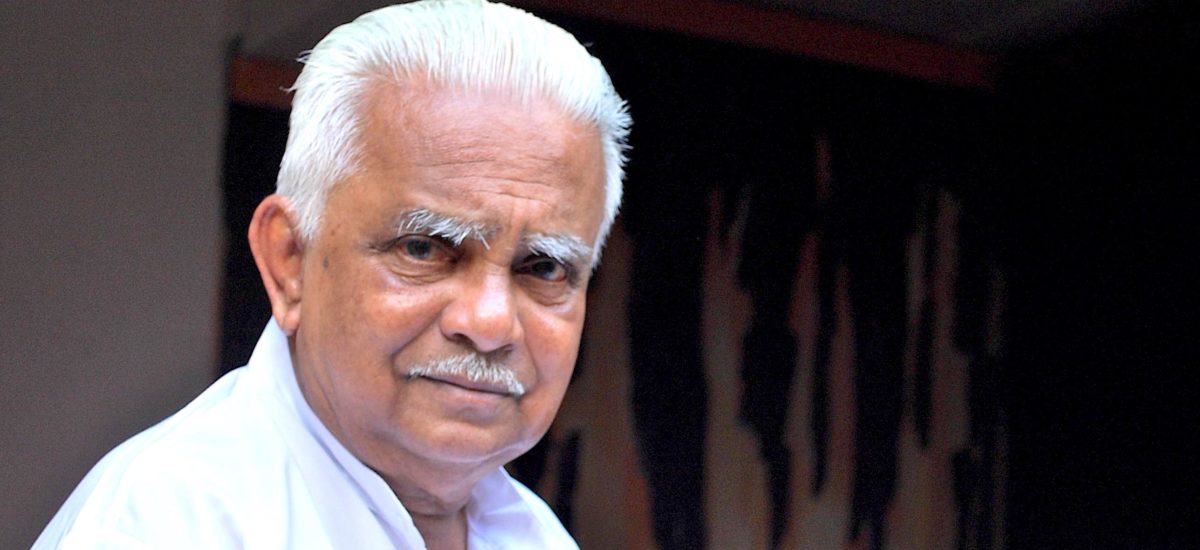Photo courtesy of Sarvodaya
The government’s decision to conduct the funeral of Dr A T Ariyaratne with state honours is a recognition of the contribution that the founder of the Sarvodaya Movement made to the country over the past 65 years when he set up the organisation.
Concepts he pioneered such as Shramadana (donation of labour), Gramodaya (village awakening) and Sarvodaya (the wellbeing of all) are today part and parcel of the mainstream of Sri Lanka’s civil and political life. His creative use of traditional practices and belief systems enabled the Sarvodaya Movement to become an organic part of the country’s development process. The great contribution that Dr Ariyaratne made was to mainstream not only traditional community-oriented practices like Shramadana but also to infuse liberal values such as pluralism and equality into civil society that enabled its spread to the four corners of the country.
Dr Ariyaratne infused the Sinhala-Buddhist culture, from where his thought and work started, as a teacher in one of Colombo’s premier Buddhist schools, Nalanda College, with values of sharing and mutual respect that reached out to other communitie in a society wracked by religious, ethnic, caste and class divisions. The Sarvodaya Movement under his leadership became a magnet for young people who wanted to contribute to the upliftment of their societies.
Many of the leaders of civil society organisations today had their period of initiation at the side of Dr Ariyaratne, who was called Loku Sir. I was one of those who worked with him and was influenced by his thinking. Three concepts he believed in are of perennial importance. First, that development needs to be for the wellbeing of all, not the wellbeing of the majority or of a minority. Second, that development is not only about economic development but also about social, cultural, moral, spiritual and political development. Third, to ensure development from below by decentralising power and resources to the lowest level possible, which to him was the village community.
Dr Ariyaratne was the quintessential civil society leader, not wielding state or political power but the power that comes from ideas and the ability to demonstrate what is possible at the micro level so that the state could replicate it at the macro level. Today, there is no place that the Sarvodaya Movement has not touched in the form of a development-oriented activity or the presence of a community worker who has not gone through at least one of its trainings. In the depths of today’s despair and economic collapse, we can only imagine the difference if even one of Sri Lanka’s many governments over the past 65 years had entrusted its national development programme to this visionary leader.
He once related to me a story to illuminate the priorities one should have in life. It was drawn from the great Russian novelist Tolstoy. The story was about a king who wanted the answer to three questions – what is the most important time in a person’s life? Who is the most important person? What is the most important thing to do? Wise (and not-so-wise) persons he questioned gave many and varied answers. Some said the time of birth (astrology), the father or mother, earning well as their answers to these three questions. Tolstoy’s answer, which met with Dr Ariyaratne’s approval was the most important time is now, the most important person is the person you are with now and the most important thing to do is to love and serve that person. When Dr Ariyaratne engaged with undivided attention with those he was with (including myself) and held their hands as he spoke looking at their faces, he lived this story.
This poem is dedicated to Dr Ariyaratne by one whose life he touched ever so gently and kindly.
‘Tis a season of life
Of celebration
Of remembering
Of introspection,
examination
and reevaluation
For the living.
‘Tis moments relived
Lessons relearnt
Love remembered.
A passing
Is not the end
But a pause
To find meaning
In our own existence,
The infinite merges
Into the now.
Sumadhu Weerawarne Perera

